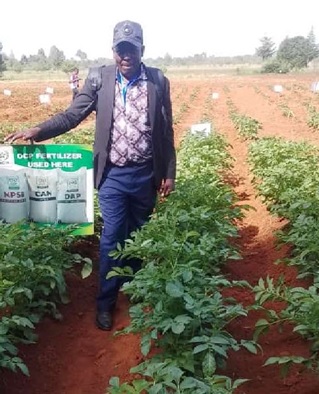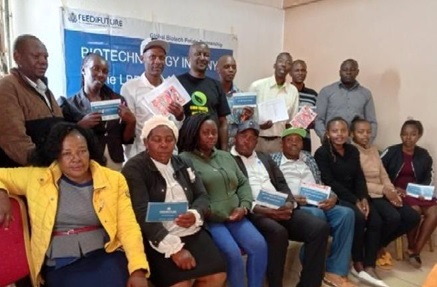Kenyan grassroots campaign shares the message of the late blight resistant potato with farmers
Kenyan grassroots campaign shares the message of the late blight resistant potato with farmers.

"Everybody was anxious to learn about this new late blight resistant potato since it appears to be the solution most farmers have been waiting for."
Lee Waithaka (at right) is a farmer in Nyeri, Kieni sub county, Mugunda ward, Kenya. With over 20 years in the potato growing industry, Lee knows potatoes. He also knows the challenges Kenyan potato farmers face.
He recently interacted with the Global Biotech Potato Partnership's Kenyan grassroots sensitization campaign led by Kataru Concepts founder, James Kamuye Kataru who visited Lee and other farmers and peer leaders.
He shares his thoughts on growing potatoes in Kenya and what the late blight resistant potato means to farmers like himself.
"I have been growing potatoes for over 20 years and doubling as a trader and broker/middleman. This has given me vast experience with potatoes and I know exactly what ails the farmers.
The first is lack of certified seed, followed by the late blight disease, made worse by expensive pesticides where farmers end up spraying their farms twice a week. The other challenge has been poor prices by brokers and middlemen.
We were sensitized on the late blight resistant GMO potato with fellow famers SACCO (Savings and Credit Cooperatives) leaders from my region where we discovered that this new potato variety is what we need to bring back the hope for farmers who had given up on the crop."
As a SACCO leader, Lee became so inspired about the late blight resistant potato that he joined the sensitization campaign to share the news among fellow farmers.
"When we moved to sensitize various farmers SACCO members, those we reached requested to be given seed immediately. Everybody was anxious to learn about this new late blight resistant potato since it appears to be the solution most farmers have been waiting for.
In my opinion, Kenyans and other farmers across Africa need to think about growing the GMO potato because it promises to fight hunger, reduce costs of production, and is safe for human consumption."
The campaign has reached over 1,200 farmers and SACCO members to date in the region.





 Print
Print Email
Email




